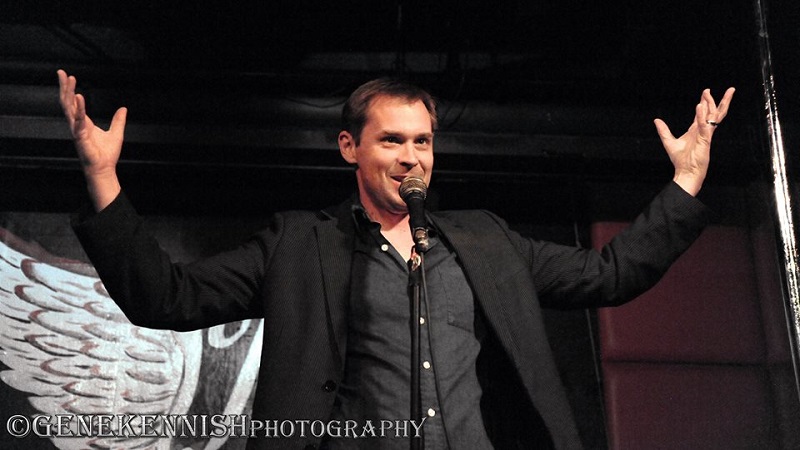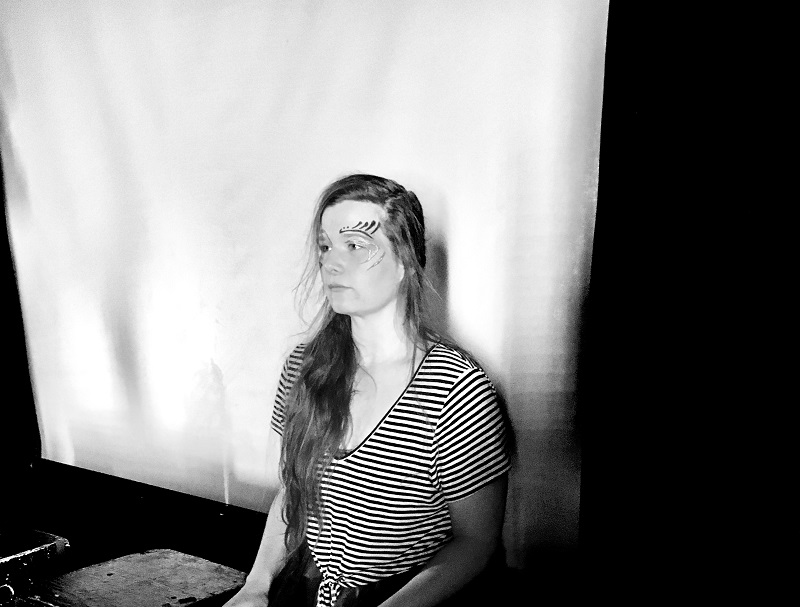
It's that time of year again: the FRIGID NY Festival is taking over the Kraine Theater and UNDER St. Marks for 19 days, with 30 plays ranging from personal narratives to parodies to science comedy to the avant-garde. We will be discussing a mere four of the productions in our two dispatches from the festival, but information and tickets for all of this year's shows can be found at www.FRIGIDnewyork.info. As every year, all proceeds from tickets sales go directly to the artists.
After last year's excellent The Gospel of Sherilyn Fenn, storyteller (and burlesque performer) Brad Lawrence returns to the Frigid Festival with another masterfully entertaining plunge into the turbulent waters of childhood. Clad in jeans and a Wilma-from-Buck Rogers t-shirt and accompanied onstage by only a chair and a bottle of water, Lawrence gets things off to a running start, recounting a first kiss in second grade. Of course, for his crush, this kiss is more about jockeying for social position than it is about Brad. The show has a keen eye for this kind of schoolyard anthropology, and Lawrence is adept at investing its subjects with immediacy. The fact that he, shy and awkward, finds little kinship with the other boys at his school, who prefer clamor and aggression, leads to bullying, teasing, and at least one significant incident of lunchbox violence.
At home, Brad takes refuge in and learns life lessons from the television. Nature shows are especial favorites, and he feels a bond with the often humanized animals that he watches. On a trip to the zoo, he expects this feeling of kinship to be recognized, but, echoing his first-kiss experience, the animals have their own agendas and put to the test his Disney-programming-inspired beliefs. Part of growing up, the show suggests, is having one's worldview repeatedly challenged in this way. Daytime talk shows immerse him in the Satanic panic and recovered memory epidemic of the 1980s, which suggests to him that anyone, including himself, could have been kidnapped for sacrifice and merely repressed the experience. His fifth grade class introduces him to the threat of total nuclear annihilation, and later, in a parallel, he learns of Ryan White's contraction of AIDS through a blood transfusion. This latter existential crisis is brought even closer to home, literally, by the fact that Brad's mother is a nurse who works with blood samples every day. One throughline that Lawrence draws through all of these experiences is that kids believe that there are answers to be had, some key to becoming an adult who can make correct sense of life. Kids are wrong.
Lawrence, in concert with Cyndi Freeman's direction, skillfully controls the rhythm of the narrative and the ebbs and flow of its intensity. The humor is often wry and occasionally scatological, but the jokes rest on a solid bedrock of heart, and several moments take aim at the hearts of the audience. Even if you don't understand the ontological distinction between Gobots and Transformers or have never personally been terrified by The Day After, Idaho Jackson is where the action is.

The second show that we are discussing here could not, in many ways, be more of a contrast to Lawrence's narrative storytelling, although both subscribe to the futility of the search for order. An Evening Conference on Feminism & Equality at Large at the Fantabulosa Esoteric Cabaret Dada eschews any overt narrative and hews close to the principles of the artistic movement in its title. An Evening Conference is performed by five barefoot women (Alexa Welch, Belinda Adam, Talia Moreta, Lorraine Tai, and Sarah Gwynne Walker) in retro-futuristic makeup. They are imagined to be at the Cabaret Voltaire in the nineteen-teens and twenties, a location that played a vital role in the founding of Dada, a leftist arts movement that rejected logic and aesthetics and elevated instead the irrational and nonsensical. Dada is most often associated with male artists such as Marcel Duchamp, Tristan Tzara, Man Ray, and Max Ernst, a historical prejudice that this production aims to rectify. The performers do not each play a specific individual but rather collectively represent artists from the Dadaist movement such as Hannah Höch, Clara Tice, Mina Loy, Florine Stettheimer, Beatrice Wood, Katherine Sophie Dreier, and Suzanne Duchamp, who have been denied, as writer/director Lucca Damilano writes, "their rightful place amongst their male counterparts who are always present in the art books."
From the start, Dada makes no pretense of theatrical verisimilitude, with one performer reading parts of the Dadaist manifesto from a handful of cards, introducing the conception of Dada as simultaneously new and primordial and questioning the definition of "sense." The show invokes the need to unlink form and content, to stop clinging to old forms, and to interrogate what we think is art, and even what we think we know. It creates onstage a kind of structured anarchy, embracing the free play of signifiers and playing with sound and movement. The result at one point might be a layering of sound into an engaging cacophony. At another point, it might imagine a boxing or wrestling match between a performer who embodies a Singer sewing machine and one who embodies a manual typewriter. The show might demonstrate that words are at best a semi-articulation of feeling with an expressive torch song in which every sung word is "Dada." It tests the line between "sense" and "nonsense" in a funny short interlude composed entirely of what we'll call indelicate language.
Near the end, the proceedings take a turn into the meta, debating the difference between art and hollow pretension, and asking, if anything can be art, then is anything art? Even the post-show applause becomes part of this consideration. The aim of feminist recovery is also most explicitly articulated near the ending, with the performers protesting being remembered as assistants, helpers, and sandwich-makers. Under this instantiation of Dada, the logic of patriarchy is one more logic to be destroyed. If a commitment to illogic and a willingness to, as Damilano suggests, "sit back, relax, and let the work wash over you and surround you," consider attending this Conference. - Leah Richard & John Ziegler
